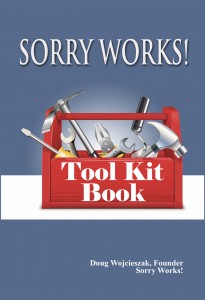Excerpt from Sorry Works! Tool Kit: Family Wants Chart?
 In the new Sorry Works! Tool Kit, we provide a comprehensive review of the most commonly asked questions and challenges you will receive when starting and sustaining a disclosure program. The Q&A section is extremely valuable for c-suite, risk, attorneys, disclosure team leaders, physicians and nursing leaders, etc. Below is one of the questions asked and answered in the Tool Kit -- to see the rest be sure to order the new Sorry Works! Tool Kit today.
Q: What do you say if the family asks for the chart?
In the new Sorry Works! Tool Kit, we provide a comprehensive review of the most commonly asked questions and challenges you will receive when starting and sustaining a disclosure program. The Q&A section is extremely valuable for c-suite, risk, attorneys, disclosure team leaders, physicians and nursing leaders, etc. Below is one of the questions asked and answered in the Tool Kit -- to see the rest be sure to order the new Sorry Works! Tool Kit today.
Q: What do you say if the family asks for the chart?
A: During a disclosure training seminar for a long-term care provider, which included role playing and discussing scenarios, a senior team member played the role of the upset family member and absolutely pelted her colleagues (who were trying to disclose to her) with the following questions and demands:
"Where's my Dad's chart? I want to see the chart! When can I see it? I need to see it...RIGHT.....NOW!!"
The senior team member turned to the crowd (her colleagues) and said, "This is the one question we get all the time when trying to talk to an upset family or resident. They want to see the chart, and see it right NOW!" Her colleagues all nodded in agreement.
The same is true in all healthcare settings, including hospitals and physician practices. Families want to know, and know.....RIGHT....NOW!
What do you do?
Of course, there are HIPAA concerns - is this family member actually entitled to the chart? Screw up here and you have a different and expensive problem to deal with. Maybe the patient doesn't want his crazy uncle from California looking at the chart. Or maybe you are standing toe-to-toe with a "pelican," that long-lost adult child who hasn't called dear old mom in twenty years, but now, sensing a financial windfall, the pelican swoops in and if you don't comply with his every demand, the pelican has threatened to poop on your head. You can't cave in here, no matter what.
But, if you look like you are stonewalling or hiding the football from a legitimate family member who should have access to the chart - "No, you can't see the chart...I'm not sure we can give it to you...it would take a while for us to get the chart to you" - you start creating a different problem. Any perception of stonewalling - real or imaginary - will almost always create the impression with family members that you are monkeying with the chart. It will put a cloud of suspicion over everything you say or do downstream, especially if you later report that the event was NOT caused by error. "Sure, they doctored the chart while they were hiding it from us!" will be the retort.
So, what did we discuss during that role play? What did the group say was the best way to handle this tricky situation?
Short answer: Continue to be proactive while following the law.
If the family member can legitimately prove they are entitled to the chart, turn it over as quickly as possible. Don't play games. Not worth it!
If, however, the family member doesn't have proof they are entitled to the chart, don't use phrases that include words like "no" or "you can't have it" or be off putting in any way. Instead, calmly explain that for the protection of the patient, privacy laws require proof that a family member is entitled to the chart. Show them what documents they need to produce, and, if possible, try to assist them in the process. Be helpful, not defensive. Perhaps provide a small "cheat sheet" to family members that cites a) the law requiring proof (in case they land in a lawyer's office) and b) what documents are needed to show proof.
If the family member is that "crazy uncle" or "pelican," the process will protect you and your patient. If, however, the family member is legitimate, the process - if handled in a helpful, proactive fashion - will not be off putting.
Another tip: When a family member demands the chart, gently ask them why they want the chart. A very wise nursing home administrator once told me that doctors and nurses almost always become defensive when the chart is requested, but, sometimes the information sought by the family is very benign or just a simple request. So, before you become defensive or start rattling off HIPPA requirements, just ask why they want the chart in a polite manner. Don't start an argument or raise suspicions when it's not necessary.
Just as importantly, try to shift the conversation to things you can do right now with service recovery items such as food, transportation, phone calls, lodging, and other forms of immediate assistance. This shows you care, you are empathetic, and are trying to help as opposed to being an obstacle. Maybe it's just listening to their problems and acknowledging how upset they are. Keep the conversation going and the relationship alive!

